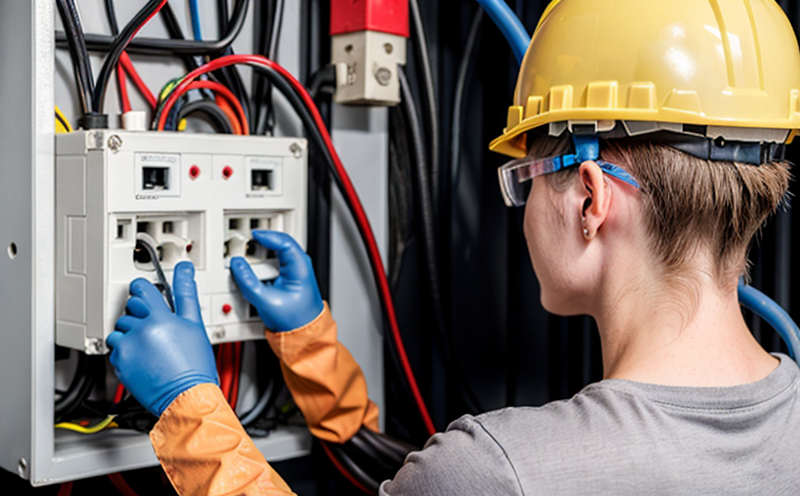UL 817 Cord Set and Power Supply Safety for IoT Systems
The UL 817 standard is a crucial benchmark in ensuring the safety of cord sets and power supplies used in various smart home and Internet of Things (IoT) devices. This standard focuses on the electrical safety aspects, which are paramount to prevent hazards such as electric shock, fire, and other accidents that can arise from improper design or manufacturing.
The UL 817 standard covers a wide range of cord sets and power supplies used in residential, commercial, and industrial applications. It is particularly relevant for IoT devices due to the increasing integration of electrical components into everyday life. Compliance with this standard ensures that the electrical systems are safe and reliable, which is essential given the growing number of connected devices.
The testing process includes rigorous evaluations of both the cord set itself and its compatibility with power supplies. The tests cover a variety of scenarios to ensure robust safety under normal use as well as potential abuse situations. This ensures that even in extreme or unexpected conditions, the device remains safe for end-users.
For IoT devices, compliance with UL 817 is not just about meeting regulatory requirements but also about enhancing brand reputation and customer trust. Consumers are increasingly concerned about safety and quality when purchasing smart home products. Meeting these standards can differentiate a product in an already crowded market by providing peace of mind to consumers.
UL 817 testing involves several key aspects, including insulation resistance, grounding continuity, overcurrent protection, and other electrical characteristics that are critical for safety. The tests simulate real-world conditions to ensure the cord sets and power supplies can withstand typical use without compromising safety. This process is essential for ensuring that the devices meet international standards of quality and reliability.
The UL 817 standard is part of a broader framework of electrical safety testing, which includes other standards such as UL 94 (flame retardancy), UL 2059 (cable assemblies), and UL 1366 (power supplies). Together, these standards provide a comprehensive approach to ensuring the safety of electrical components in IoT devices.
The testing process itself involves multiple stages. Initially, the device is subjected to visual inspection to ensure that it meets basic design requirements. Following this, more detailed tests are conducted using specialized equipment and scenarios designed to mimic real-world conditions. These tests can include short-circuit protection, overvoltage protection, and other critical safety features.
Compliance with UL 817 is not only about meeting regulatory standards but also about ensuring that the device functions reliably under all expected use cases. This includes testing for durability, performance consistency, and adaptability to different environments. The standard aims to provide a level of assurance that the cord sets and power supplies can operate safely in diverse conditions.
The importance of UL 817 compliance cannot be overstated, especially given the rapid pace at which IoT technology is evolving. As new devices are introduced, ensuring they meet these standards becomes even more critical to prevent potential hazards. The standard also plays a role in fostering innovation by setting clear safety benchmarks that developers can aspire to meet.
Given the growing complexity of IoT systems and the increasing reliance on electrical components, compliance with UL 817 is essential for ensuring safe integration into homes and businesses. This standard provides a robust framework for testing that ensures devices are reliable and secure, which is vital as more connected devices come to market.
Applied Standards
| Standard | Description |
|---|---|
| UL 817 | Covers safety requirements for cord sets and power supplies used in residential, commercial, and industrial applications. |
| IEC 62368-1 | Safety of information technology equipment - Part 1: Power supply units. |
Benefits
- Enhanced safety for end-users, preventing accidents and potential hazards.
- Achieving compliance with international standards, ensuring market access in multiple regions.
- Promoting brand reputation and customer trust through adherence to rigorous testing protocols.
- Ensuring reliability and durability of devices under various environmental conditions.
Industry Applications
The UL 817 standard is widely applicable across numerous industries, particularly in the realm of smart home and IoT device testing. It is essential for manufacturers of cord sets, power supplies, and related electrical components used in these devices.
For developers working on IoT systems that incorporate electrical components, compliance with UL 817 ensures that their products meet stringent safety requirements. This is particularly important given the increasing number of connected devices entering the market. Meeting these standards can differentiate a product by demonstrating a commitment to quality and safety.
The standard also benefits quality managers and compliance officers who are responsible for ensuring that products meet regulatory requirements. By adhering to UL 817, they can ensure that their products are safe and reliable, which is crucial in an industry where consumer trust is paramount.
R&D engineers involved in the design and development of IoT devices also benefit from compliance with this standard. It provides a clear framework for testing and ensures that the devices meet all necessary safety requirements before they reach market.





